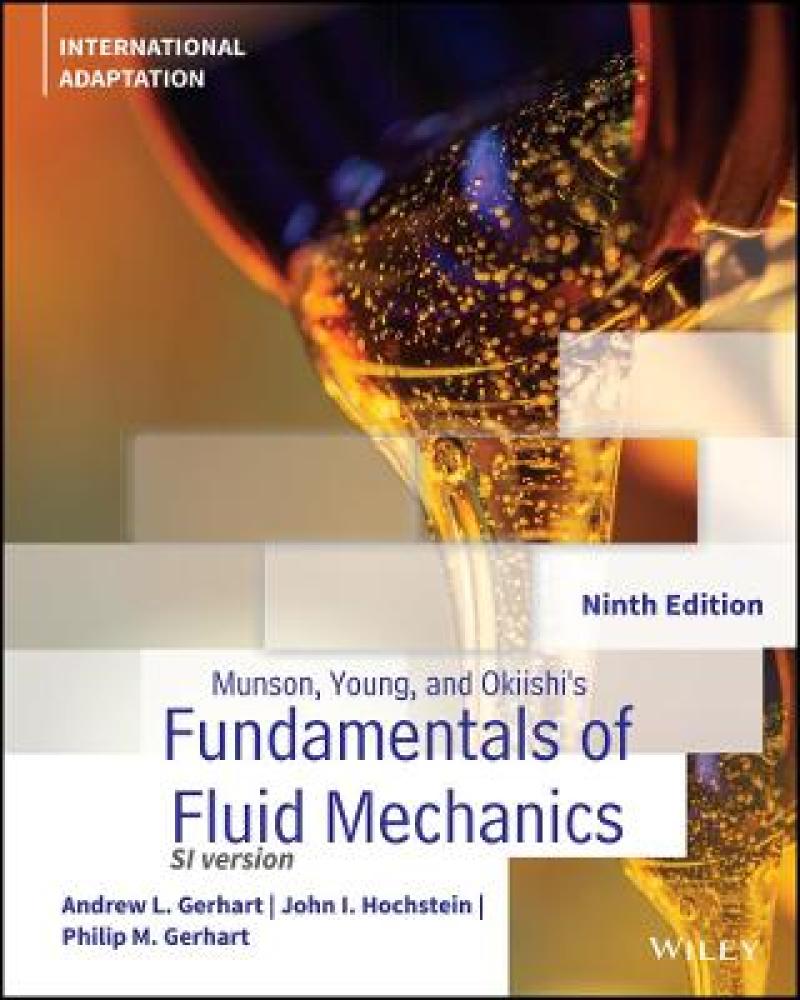Munson, Young, and Okiishi's Fundamentals of Fluid Mechanics is intended for undergraduate engineering students for use in a first course on fluid mechanics. Building on the well-established principles of fluid mechanics, the book offers improved and evolved academic treatment of the subject. Each important concept or notion is considered in terms of simple and easy-to-understand circumstances before more complicated features are introduced. The presentation of material allows for the gradual development of student confidence in fluid mechanics problem solving. This International Adaptation of the book comes with some new topics and updates on concepts that clarify, enhance, and expand certain ideas and concepts. The new examples and problems build upon the understanding of engineering applications of fluid mechanics and the edition has been completely updated to use SI units.
Les mer
1 INTRODUCTION Learning Objectives 1.1 Characteristics of Fluids 1.2 Dimensions, Dimensional Homogeneity, and Units 1.3 Analysis of Fluid Behavior 1.4 Measures of Fluid Mass and Weight 1.5 Ideal Gas Law 1.6 Viscosity 1.7 Compressibility of Fluids 1.8 Vapor Pressure 1.9 Surface Tension 1.10 A Brief Look Back in History CHAPTER SUMMARY AND STUDY GUIDE KEY EQUATIONS REFERENCES PROBLEMS 2 FLUID STATICS Learning Objectives 2.1 Pressure at a Point 2.2 Basic Equation for Pressure Field 2.3 Pressure Variation in a Fluid at Rest 2.4 Standard Atmosphere 2.5 Measurement of Pressure 2.6 Manometry 2.7 Mechanical and Electronic Pressure Measuring Devices 2.8 Hydrostatic Force on a Plane Surface and Pressure Diagram 2.9 Hydrostatic Force on a Curved Surface 2.10 Buoyancy, Flotation, and Stability 2.11 Pressure Variation in a Fluid with Rigid Body Motion 2.12 Equilibrium of moving fluids (Special case of Fluid Statics CHAPTER SUMMARY AND STUDY GUIDE KEY EQUATIONS REFERENCES PROBLEMS 3 FLUID KINEMATICS Learning Objectives 3.1 The Velocity Field 3.2 The Acceleration Field 3.3 Control Volume and System Representations 3.4 The Reynolds Transport Theorem CHAPTER SUMMARY AND STUDY GUIDE KEY EQUATIONS REFERENCES PROBLEMS 4 ELEMENTARY FLUID DYNAMICS--THE BERNOULLI EQUATION Learning Objectives 4.1 Newton’s Second Law 4.2 F = ma along a Streamline 4.3 F = ma Normal to a Streamline 4.4 Physical Interpretations and Alternate Forms of the Bernoulli Equation 4.5 Static, Stagnation, Dynamic, and Total Pressure 4.6 Applications of Bernoulli Equation 4.7 The Energy Line and the Hydraulic Grade Line 4.8 Restrictions on Use of the Bernoulli Equation CHAPTER SUMMARY AND STUDY GUIDE KEY EQUATIONS REFERENCES PROBLEMS 5 FINITE CONTROL VOLUME ANALYSIS Learning Objectives 5.1 Conservation of Mass--The Continuity Equation 5.2 Newton’s Second Law--The Linear Momentum and Moment of Momentum Equations 5.3 First Law of Thermodynamics--The Energy Equation CHAPTER SUMMARY AND STUDY GUIDE KEY EQUATIONS REFERENCES PROBLEMS 6 DIFFERENTIAL ANALYSIS OF FLUID FLOW Learning Objectives 6.1 Fluid Element Kinematics 6.2 Conservation of Mass 6.3 The Linear Momentum Equation 6.4 Inviscid Flow 6.5 Some Basic, Plane Potential Flows 6.6 Superposition of Basic, Plane Potential Flows 6.7 Other Aspects of Potential Flow 6.8 Viscous Flow 6.9 Some Simple Solutions for Laminar, Viscous, Incompressible Flows 6.10 Other Aspects of Differential Analysis CHAPTER SUMMARY AND STUDY GUIDE KEY EQUATIONS REFERENCES PROBLEMS 7. DIMENSIONAL ANALYSIS AND MODEL SIMILITUDE Learning Objectives 7.1 The Need for Dimensional Analysis 7.2 Buckingham Pi Theorem 7.3 Determination of Pi Terms 7.4 Some Directions about Dimensional Analysis 7.5 Determination of Pi Terms by Inspection 7.6 Common Dimensionless Groups in Fluid Mechanics 7.7 Correlation of Experimental Data 7.8 Modeling and Similitude 7.9 Typical Model Studies CHAPTER SUMMARY AND STUDY GUIDE KEY EQUATIONS REFERENCES PROBLEMS 8 VISCOUS FLOW IN PIPES Learning Objectives 8.1 General Characteristics of Pipe Flow 8.2 Fully Developed Laminar Flow 8.3 Fully Developed Turbulent Flow 8.4 Pipe Flow Losses via Dimensional Analysis 8.5 Pipe Flow Examples 8.6 Pipe Flowrate Measurement CHAPTER SUMMARY AND STUDY GUIDE KEY EQUATIONS REFERENCES PROBLEMS 9 FLOW OVER IMMERSED BODIES Learning Objectives 9.1 General External Flow Characteristics 9.2 Drag 9.3 Lift 9.4 Boundary Layer Characteristics CHAPTER SUMMARY AND STUDY GUIDE KEY EQUATIONS REFERENCES PROBLEMS 10 OPEN CHANNEL FLOW Learning Objectives 10.1 General Characteristics of Open Channel Flow 10.2 Surface Waves 10.3 Energy Considerations 10.4 Uniform Flow 10.5 Most Efficient Channel Section 10.6 Gradually Varied Flow 10.7 Rapidly Varied Flow CHAPTER SUMMARY AND STUDY GUIDE KEY EQUATIONS REFERENCES PROBLEMS 11 COMPRESSIBLE FLOW Learning Objectives 11.1 Ideal Gas Thermodynamics 11.2 Stagnation Properties 11.3 Mach Number and Speed of Sound 11.4 Compressible Flow Regimes 11.5 Shock Waves 11.6 Isentropic Flow 11.7 One Dimensional Flow in a Variable Area Duct 11.8 Constant Area Duct Flow with Friction 11.9 Frictionless Flow in a Constant Area Duct with Heating or Cooling 11.10 Analogy Between Compressible and Open Channel Flows 11.11 Two Dimensional Supersonic Flow 11.12 Effects of Compressibility in External Flow CHAPTER SUMMARY AND STUDY GUIDE KEY EQUATIONS REFERENCES PROBLEMS 12 TURBOMACHINES Learning Objectives 12.1 Introduction 12.2 Basic Energy Considerations 12.3 Angular Momentum Considerations 12.4 The Centrifugal Pump 12.5 Axial Flow and Mixed Flow Pumps 12.6 Dimensionless Parameters and Similarity Laws 12.7 Turbines 12.8 Fans 12.9 Compressible Flow Turbomachines CHAPTER SUMMARY AND STUDY GUIDE KEY EQUATIONS REFERENCES PROBLEMS APPENDIX A Computational Fluid Dynamics APPENDIX B Physical Properties of Fluids APPENDIX C Properties of the U.S. Standard Atmosphere APPENDIX D Compressible Flow Functions for an Ideal Gas with k = 1.4 APPENDIX E Comprehensive Table of Conversion Factors INDEX
Les mer
Produktdetaljer
ISBN
9781119703266
Publisert
2021-06-28
Utgave
9. utgave
Utgiver
Vendor
John Wiley & Sons Inc
Vekt
454 gr
Høyde
10 mm
Bredde
10 mm
Dybde
10 mm
Aldersnivå
U, 05
Språk
Product language
Engelsk
Format
Product format
Heftet
Antall sider
784
